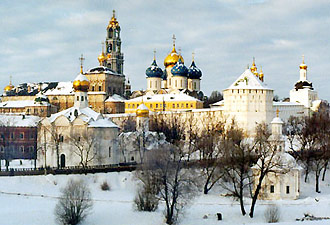 |
 75km to the northeast of Moscow lies the town of Sergiev Posad (Zagorsk in the Soviet era). Although it is nowadays an industrial centre with a population of over 100,000, its fame rests on the Trinity Lavra of St. Sergii (a Lavra is the highest rank of Orthodox monastery, and there are only four in all Russia), the Russian Orthodox equivalent of the Vatican, which has a complex of medieval buildings to rival those of the Kremlin.
75km to the northeast of Moscow lies the town of Sergiev Posad (Zagorsk in the Soviet era). Although it is nowadays an industrial centre with a population of over 100,000, its fame rests on the Trinity Lavra of St. Sergii (a Lavra is the highest rank of Orthodox monastery, and there are only four in all Russia), the Russian Orthodox equivalent of the Vatican, which has a complex of medieval buildings to rival those of the Kremlin.
The monastery is named after St. Sergii of Radonezh, a 14th century monk from Rostov whose pious, ascetic existence attracted numerous followers to the hermit's retreat he had established in the forests around Moscow. The wooden monastery built by Sergii and his followers was razed by the Tartars shortly after his death, but his tomb survived and, in 1422, the year of his canonization, work began on the construction of the Trinity Cathedral.
This imposing, white-stone building, with unusual sloping walls and gold dome, became a blue-print for Russian church architecture and the inspiration for the Kremlin's Cathedral of the Assumption. In 1458 a brick chapel was added to house the tomb of Sergii's successor, Nikon of Radonezh. Inside the Cathedral there is a silver shrine containing the relics of St. Sergii, and an iconostasis with many works by Andrei Rublev.
In 1476, Ivan the Great instructed craftsmen from Pskov to build the graceful Church of the Holy Ghost, a rectangular structure of white brick, topped by a slender, blue and gold domed bell-tower, which also acted as a lookout post.
In the decade after 1540, the monastery's wooden fortifications were replaced with the mile-long brick walls that stand to this day. They were made higher in the mid 17th century, and tent-roofed spires were added to six of their ten defensive towers, as happened at the Kremlin at about the same time. The towers have names such as the Drying Tower and the Beer Tower, which refer to their former functions.
Ivan the Terrible's successful assault on Kazan in 1552 was prompted by the advice of Abbot Bassyan, head of the Trinity Lavra, and the Tsar expressed his gratitude by ordering the construction of the Cathedral of the Assumption. It was completed in 1585, during the regency of Boris Gudonov, who lies with his family in a modest tomb beneath the Cathedral walls. The Cathedral is similar in structure to its namesake in the Kremlin - and equally impressive - the major difference being in the colour scheme: Here the white walls contrast with four azure domes and a larger central gold one. Inside the Cathedral, a two-headed eagle stands as monument to the time in 1685 when the future Peter the Great took refuge here with his mother and brother from the marauding Streltsy. The boy Tsar was only saved by the sanctity of the place and the fortuitous arrival of a loyal cavalry regiment.
There are several other churches and chapels within and just outside the monastery walls, but the other main architectural attractions are the Refectory, a palatial building with intricate and brightly coloured decorations, completed in 1692, and the ornate Tsar Palace of the same period, which later became the Theological Academy.
Although the Russian capital moved to St. Petersburg, the Trinity Monastery remained the centre of the Russian Church until 1920, when the monastery was closed by the Bolshevik government, and the monks were sent off to labour camps. Stalin permitted the reopening of the monastery as part of victory celebrations in 1946, and it was the seat of the Russian Patriarch from then until 1988, when the honour was bestowed on the more central Danilov Monastery.
Ever since St. Sergii founded the monastery in the 14th Century, it has been a hugely popular destination for pilgrims, revered by all from Tsars to Soviet pensioners. If you have the chance to make only one day trip out of Moscow, then this is certainly where you should go.
Getting there: To get to Sergiev Posad, you can either book an organized tour or - a considerably cheaper option - take the suburban train from Yaroslavl Station (Metro Komsomolskaya). Trains go about every 20-30 minutes, and take an hour and a half. The first train leaves Moscow just after 05:00, and the last train back departs just before midnight.
Opening hours: The monastery is open daily from 0:800 to 18:00, but the churches are not open to the public at weekends, and the Lavra's museum, which has a collection of icons and royal portraits, is closed on Mondays.
|
 |

 75km to the northeast of Moscow lies the town of Sergiev Posad (Zagorsk in the Soviet era). Although it is nowadays an industrial centre with a population of over 100,000, its fame rests on the Trinity Lavra of St. Sergii (a Lavra is the highest rank of Orthodox monastery, and there are only four in all Russia), the Russian Orthodox equivalent of the Vatican, which has a complex of medieval buildings to rival those of the Kremlin.
75km to the northeast of Moscow lies the town of Sergiev Posad (Zagorsk in the Soviet era). Although it is nowadays an industrial centre with a population of over 100,000, its fame rests on the Trinity Lavra of St. Sergii (a Lavra is the highest rank of Orthodox monastery, and there are only four in all Russia), the Russian Orthodox equivalent of the Vatican, which has a complex of medieval buildings to rival those of the Kremlin.